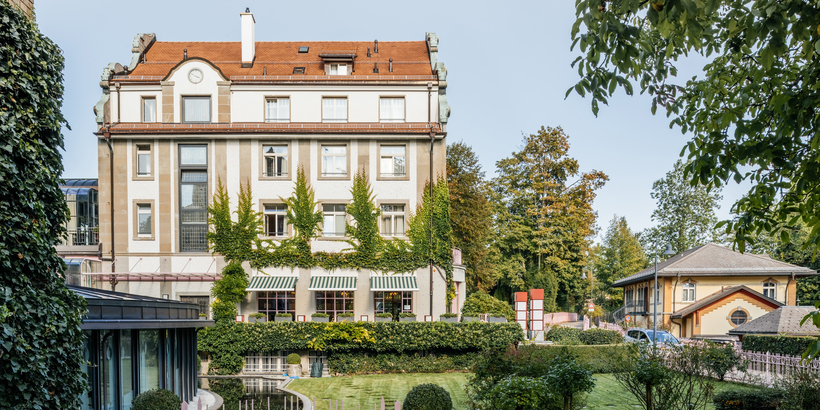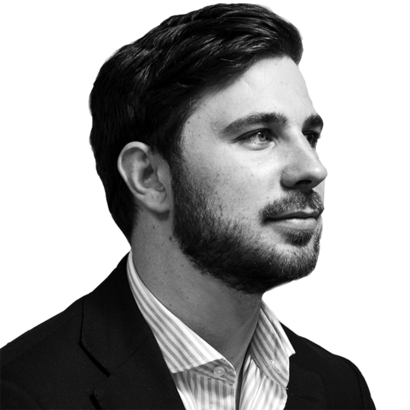You can tell a lot about a school from its most famous sons. Eton will always be defined by the flagrant smoothy and the born-to-rule—Boris Johnson, David Cameron, Anthony Eden, et al. Le Rosey is the spiritual home of the Euro gadabout and the family curse–baiter—Rothschilds, Radziwills, Rockefellers. The Dragon, meanwhile, is a petri dish for peppy actors and self-confessed attention seekers—Emma Watson, Hugh Laurie, Tom Hiddleston.
Institut auf dem Rosenberg boasts no notable alumni. That’s not because nobody went there, of course—but because almost everybody did. “Our former students are some of the most successful people in the world,” Bernhard Gademann, the fourth-generation headmaster of the Swiss boarding school, tells me. “They’re technology founders, Silicon Valley figures, members of well-established industrial dynasties—real world changers. But we have a rule that we never speak about them, I’m afraid.”
“Our former students are some of the most successful people in the world.”
This is the stuff of a conspiracy theorist’s fever dream. The Bilderberg feeder school with an omertà to shame the Cosa Nostra and an alpine setting to make a Bond villain weep; Institut auf dem Rosenberg—where the helicopter parents have their own helicopters. But the truth behind this built-in discretion is far more mundane. It stems from a very Swiss humility coupled with a quiet confidence: Rosenberg is simply so successful at what it does that it doesn’t need to shout about it. “Any one who has been to an English public school,” wrote Evelyn Waugh in Decline and Fall, “will always feel comparatively at home in prison.” In just the same way, everyone who has ever been to Institut auf dem Rosenberg will always feel rather cozy in the corridors of power.

This is no accident. The 300 students here represent some 48 nationalities in a kind of kindergarten Davos, while the campus—located above the chocolate-box town of St. Gallen—is a hamlet of fin de siècle Art Nouveau mansions. The children are at home on horseback and off piste. The rooms, many of which are double and en suite, have cherrywood floors, and the loos are skirted in marble. The chefs, who have trained at Michelin-star restaurants, serve up French onion soup, tuna Niçoise salad, and veal escalope for lunch, while the laboratories have been described by Luxurious Magazine, not inaccurately, as “Google-style.”
“We have a state-of-the-art, industry-grade robot that can interact with humans,” says Gademann, a charming man with round spectacles and a Mitteleuropean accent full of relaxed rigor. “We have 3-D printers, virtual-reality equipment, and our own hologram-maker.”
Some 48 nationalities in a kind of kindergarten Davos.
“We start at pre-school working with ETH Zürich—the university of Albert Einstein that is the No. 1 science and technology university in [Continental] Europe. And we have professors from their programs teaching pre-schoolers about coding and artificial intelligence.” (Somewhere, deep in the Swiss Alps, a five-year-old is re-animating the ghost of Steve Jobs.) The students also have their own Rosenberg app, designed in-house and calibrated to “augment the learning experience,” says Gademann. “They can use it as a communication tool with the teachers, but they can also use it to learn about themselves through data, in terms of strengths and weaknesses.”
These aren’t simply baubles with which to justify Institut auf dem Rosenberg’s fees. (At around $130,000 a year, the school is among the most expensive in the world.) They’re symptoms of the school’s unique obsession with the future. “We have to accept that the world is changing, and that education is changing at a rapid pace,” says Gademann. “Exam-based learning, in terms of relevance to life, is a big waste of time. We’re very successful at providing outstanding exam grades, but at the same time we know this is the vanilla stuff. So we teach pretty much anything from international law to product design and entrepreneurship. Why would a seven-year-old not want to learn how to pitch a business idea? This is the icing on the cake.”

Rosenberg pupils can sign up for “co-curricular” lessons in “Wealth Creation & Investment,” “Diplomacy & Leadership, Model UN,” and “The Art of Strategy & Game Theory”—courses that sit somewhere between a TED Talk and an M.B.A. on the scale of personal ambition. Then there’s the programs with three-Michelin-starred restaurants where students can go to cook for a day; the trips to the Norman Foster Foundation; the weekend at the five-starred Chedi resort in Andermatt to study hotel management. We’re not in Kansas anymore. We’re not even in Cambridge. Soon, between the Pavlova and the Pilates, a question beckons. Is there not a small danger, with all these outstanding facilities and all this access to expertise, that Rosenberg students might lose a sense of perspective? Might the kids here not all become a little, well, spoiled?
The children are at home on horseback and off piste.
“There are hardly any problems with a superiority complex among the students at Rosenberg,” Gademann replies. “Nobody here cares about a watch or the car your mum drives—because they’re all the same. Everyone having a privileged background actually levels the playing field—you just get judged on your own achievements,” he says.
“There’s nothing wrong with growing up in a privileged environment—there’s just a problem in not being aware of your privilege,” Gademann tells me. “I often say to the children: ‘This is like starting the marathon at the halfway mark. You better win. Everything else is a complete failure.’”
Courses that sit somewhere between a TED Talk and an M.B.A. on the scale of personal ambition.
You sense that Rosenberg runs in Gademann’s blood, or quite possibly the other way around. The fourth-generation scion of the Institut was a pupil here himself in the 80s, and though his father never pressured him to take the reins, he always felt—after an international career in finance and technology—that he would one day return to the helm. “It’s becoming quite unique for a school to be family run,” he admits. “A lot of schools are being bought up by private-equity companies and turned into businesses. But for me we must stay independent—it’s a challenge of the entrepreneurial spirit to test the boundaries of what young people are capable of. ” (Rosenberg is one of the few private schools in the world to accept no donations of any sort.)

Has the place changed since he was a boy? “Not in the way it feels, no,” he says. “It was always a melting pot, with a truly international atmosphere. And the students are still super-polite and entrepreneurial—and just as cheeky.”
“I want to nurture that spirit. I think cheekiness is one of the most important things in life. We have something here called the Rosenberg Code. It outlines the responsibilities and rights of each student. And I always enjoy being challenged on the code by the students, because it’s pretty much the same principles as later on in life. Don’t take no for an answer. Read the law. Figure out a loophole. Find that rule that will protect you,” Gademann says.
“Unfortunately, in traditional education, students are basically taught to shut up and listen,” the headmaster concludes. “Really, we should do the opposite—we should make them feel that they can influence their own destiny.”
Joseph Bullmore is an Editor at Large for Air Mail based in London


